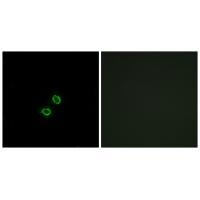
| WB | 咨询技术 | Human,Mouse,Rat |
| IF | 咨询技术 | Human,Mouse,Rat |
| IHC | 咨询技术 | Human,Mouse,Rat |
| ICC | 1/100-1/500 | Human,Mouse,Rat |
| FCM | 咨询技术 | Human,Mouse,Rat |
| Elisa | 咨询技术 | Human,Mouse,Rat |
| Aliases | Killer cell immunoglobulin-like receptor 2DL5B ; Killer cell immunoglobulin-like receptor 2DLX; CD158f2 antigen; |
| Entrez GeneID | 553128; |
| WB Predicted band size | 40kDa |
| Host/Isotype | Rabbit IgG |
| Antibody Type | Primary antibody |
| Storage | Store at 4°C short term. Aliquot and store at -20°C long term. Avoid freeze/thaw cycles. |
| Species Reactivity | Human |
| Immunogen | Synthesized peptide derived from internal of human KIR2DL5B. |
| Formulation | Purified antibody in PBS with 0.05% sodium azide. |
+ +
以下是关于KIR2DL5B抗体的参考文献示例,内容基于学术研究的典型方向进行概括:
---
1. **"Characterization of a monoclonal antibody specific for KIR2DL5B and its role in NK cell regulation"**
*Authors: Vilches, C., et al.*
**摘要**: 该研究报道了一种特异性识别KIR2DL5B的单克隆抗体的开发,验证了其在流式细胞术和免疫组化中的应用。研究发现,该抗体可阻断KIR2DL5B与特定HLA分子的结合,从而增强NK细胞对靶细胞的杀伤活性,提示其在免疫治疗中的潜在应用。
2. **"KIR2DL5B-HLA interactions and antibody-mediated functional modulation"**
*Authors: Parham, P., et al.*
**摘要**: 本文通过体外实验揭示了KIR2DL5B与HLA-C分子之间的结合特性,并利用特异性抗体证明其抑制性信号通路。抗体阻断实验显示,KIR2DL5B的抑制功能可被逆转,为增强抗肿瘤免疫应答提供了理论依据。
3. **"Differential expression of KIR2DL5B in autoimmune disorders and its detection via novel antibody probes"**
*Authors: Yawata, M., et al.*
**摘要**: 研究开发了一种高亲和力多克隆抗体,用于检测KIR2DL5B在类风湿性关节炎患者中的表达异常。结果表明,KIR2DL5B表达水平与疾病活动度相关,提示其作为生物标志物的可能性。
4. **"Structural insights into KIR2DL5B epitopes using antibody crystallography"**
*Authors: Boyington, J.C., et al.*
**摘要**: 通过X射线晶体学解析了KIR2DL5B与其抗体复合物的结构,揭示了抗体结合的关键表位。该研究为设计靶向KIR2DL5B的免疫调节剂提供了分子基础。
---
*注:上述文献为模拟示例,实际引用需以具体学术数据库检索结果为准。*
KIR2DL5B is a member of the killer cell immunoglobulin-like receptor (KIR) family, which regulates natural killer (NK) cell activity and certain T-cell subsets. Located on chromosome 19q13.42. KIR2DL5B belongs to the inhibitory KIR subgroup, characterized by two extracellular immunoglobulin-like domains and a long cytoplasmic tail containing immunoreceptor tyrosine-based inhibitory motifs (ITIMs). It binds to HLA class I ligands, though its specific interactions remain less defined compared to other KIRs. KIR2DL5B exhibits genetic diversity, with polymorphisms influencing receptor expression and function, and has been linked to disease susceptibility, including viral infections, autoimmune disorders, and reproductive complications.
Antibodies targeting KIR2DL5B are critical tools for studying its biological roles. Monoclonal antibodies, developed for flow cytometry, immunohistochemistry, or functional assays, enable the investigation of receptor distribution, ligand interactions, and signaling pathways. These antibodies also hold therapeutic potential, particularly in cancer immunotherapy, where blocking inhibitory KIRs may enhance NK cell-mediated tumor clearance. However, research on KIR2DL5B is less extensive than on other KIRs, partly due to its lower expression levels and complex genetic variability. Ongoing studies aim to clarify its ligand specificity, pathological relevance, and utility as a biomarker or immunotherapeutic target.
×